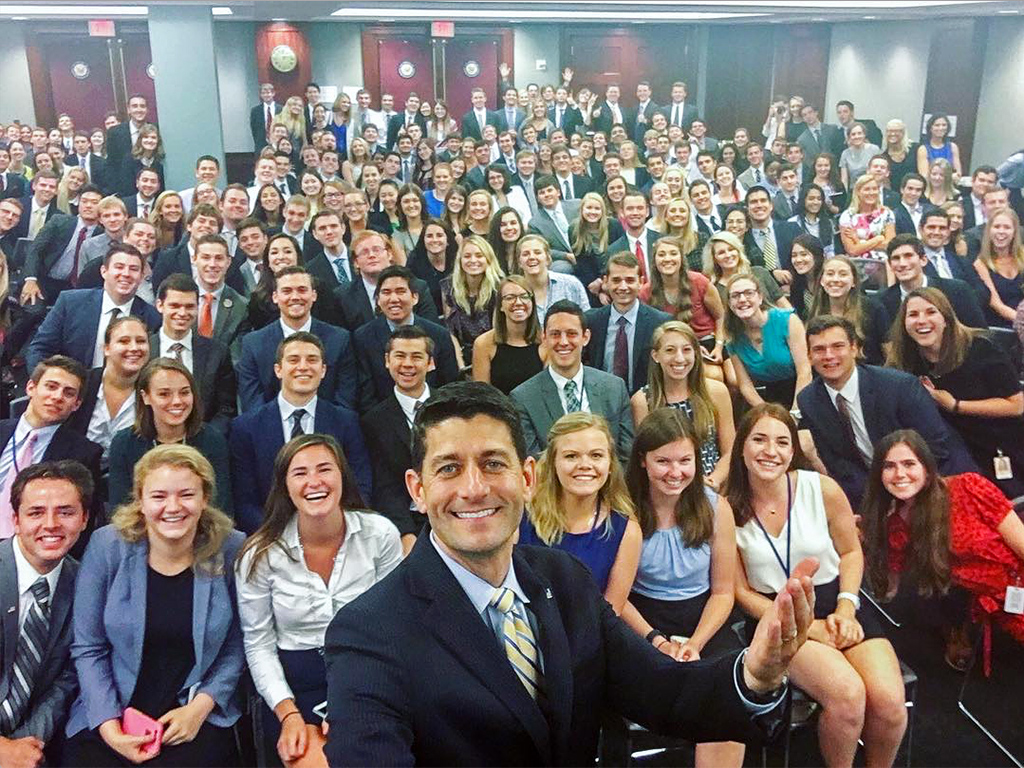Over the summer, a picture on Speaker of the House Paul Ryan’s Instagram went viral for its lack of racial diversity. The photo was of a group of interns, all of whom appeared to be white. Sensing an opportunity to yet again brand Republicans as “racist,” Democrats responded by organizing a giant group selfie of all the Democratic congressional interns to highlight their diversity.
These photos and the discussion surrounding them symbolize how simplified the concept of diversity has become in American politics. A casual consumer of news wouldn’t know that the group of interns in Paul Ryan’s photo was not, in fact, his personal office interns, but the audience of a lecture open to all Congressional interns. They wouldn’t know that the number of interns who signed up for the event was so large that the Senate Committee on Rules and Administration and the Committee on House Administration— the two groups that run the intern lecture series—had to do a random drawing to decide the attendees.
Thus, it is not that Paul Ryan only has white interns, but that the sample of congressional interns who were interested in what Speaker Ryan had to say only contained white-looking individuals. While this fact has its own implications, particularly for the Republican party, it distracts us from the broader problem: the word “diversity” has become a tool instead of a goal. What the politicians failed to grasp in the Great Selfie War of 2016 is that skin color does not wholly constitute diversity. It is only easily accessible because you don’t need to get to know a person in order to identify his or her race. The Democrats forgot to acknowledge the possible ethnic, religious, socio-economic, sexually-oriented, and—perhaps the most polarizing of all—ideological diversities when criticizing Paul Ryan’s photograph. But beyond recognizing diversities that a camera cannot capture, Democrats forgot that their own interns are not particularly diverse beyond appearances. After all, only a certain demographic of students can afford to complete an unpaid three-month internship, while having to find housing, buy meals, and pay for transportation. Unfortunately, that demographic excludes students from the poorest and most underrepresented families.
The most concerning thing to me was the way in which Democrats responded. For anyone who claims congressmen do nothing but bicker and campaign, this would be a prime example. Democrats had a golden opportunity to open a dialogue with Republicans and work towards making the federal government a more inclusive employer. Not only might it have resulted in better opportunities for disadvantaged internship seekers, the Democrats would have had the political advantage. No one could accuse them of being petty or fault them for not trying. For the sole purpose of having the last word, Congresswoman Eddie Bernice Johnson posted a picture of progress presented as ideal, congratulated the Democratic party, and closed the discussion.
This is a greater trend that’s become more and more pronounced throughout the election cycle. In the first Democratic debate, when asked how her administration and policies would be different from President Obama’s, Hillary Clinton answered: “Well, I think that’s pretty obvious. I think being the first woman president would be quite a change from the presidents we’ve had up until this point, including President Obama” as if simply being a woman is enough. There were plenty of women who fought against the 19th Amendment, and there are many women today who deny the ability of a woman, any woman, to be president. While Clinton’s proposed policies do attempt to improve women’s economic opportunities, healthcare, and safety, the rhetoric is still dangerous. The Democrats seem to think that simply by virtue of not being conservative, they can claim to promote diversity. They champion diversity these days to wield it as a sword against Republicans, rather than see it as a goal in and of itself.
Just as each individual holds many different identities, those identities do not define a person’s actions or thoughts. Democrats claim to be crusaders for greater diversity, but to what degree do they actually work toward these claims? In my experience this summer,Democrats appeared to use diversity for rhetorical purposes whenever it was politically advantageous, and forget about it after the moment was over. I interned in the office of a Democratic senator and I was in the second picture. I was in that picture despite my reservations because, as a minority, I felt somewhat obliged to be in it. A friend and fellow intern decided not to attend because he had other obligations and as a white male, didn’t feel that he had much to contribute. The concept of diversity is predicated on equality, and yet the very act of taking a “diverse picture” sets different expectations for different people. Diversity in politics, if discussed at all beyond a self-righteous, political jab, is a very over-simplified and exploitative term.
Diversity is an acknowledgement that humankind loves to divide itself and a commitment to equalize those divisions. Society thrives when people participate and understand each other. We all have different backgrounds and perspectives, and a representation of these perspectives allows for the best policies in a democratic society. The next time Republicans act in a discriminatory way, as they are sure to do with Donald Trump as the nominee, Democrats should invite them to work together instead of closing the debate with an act of false superiority.
Kaei Li is a sophomore in the SFS.






